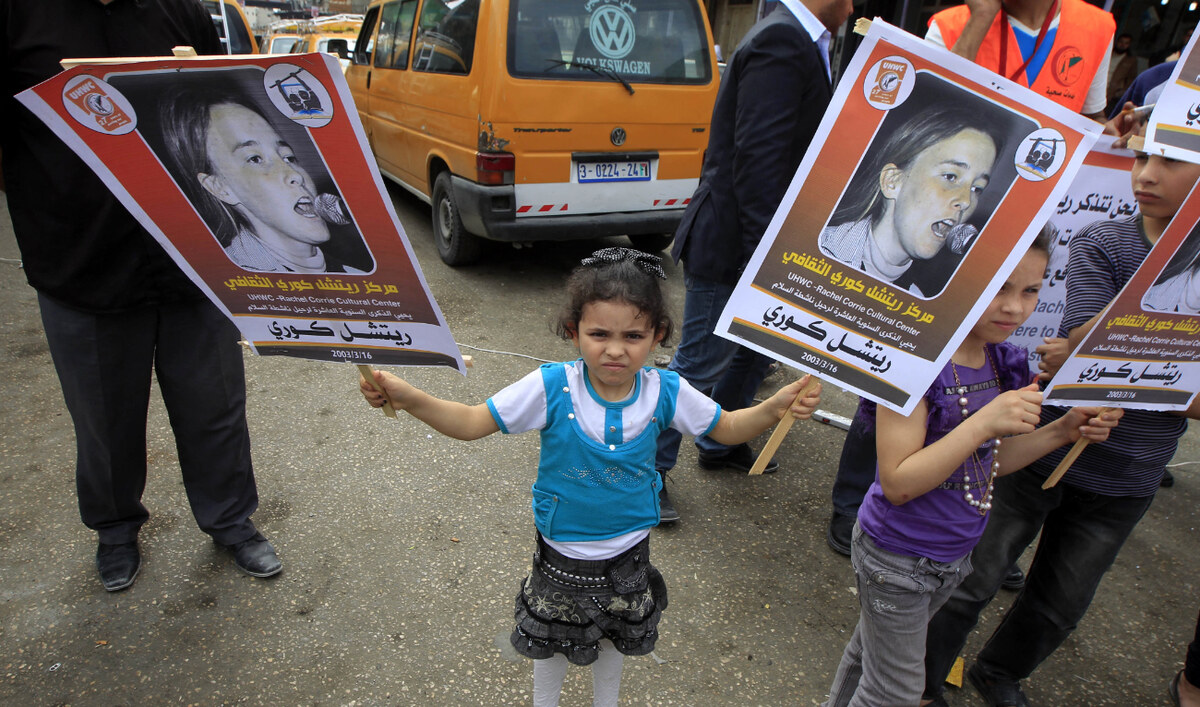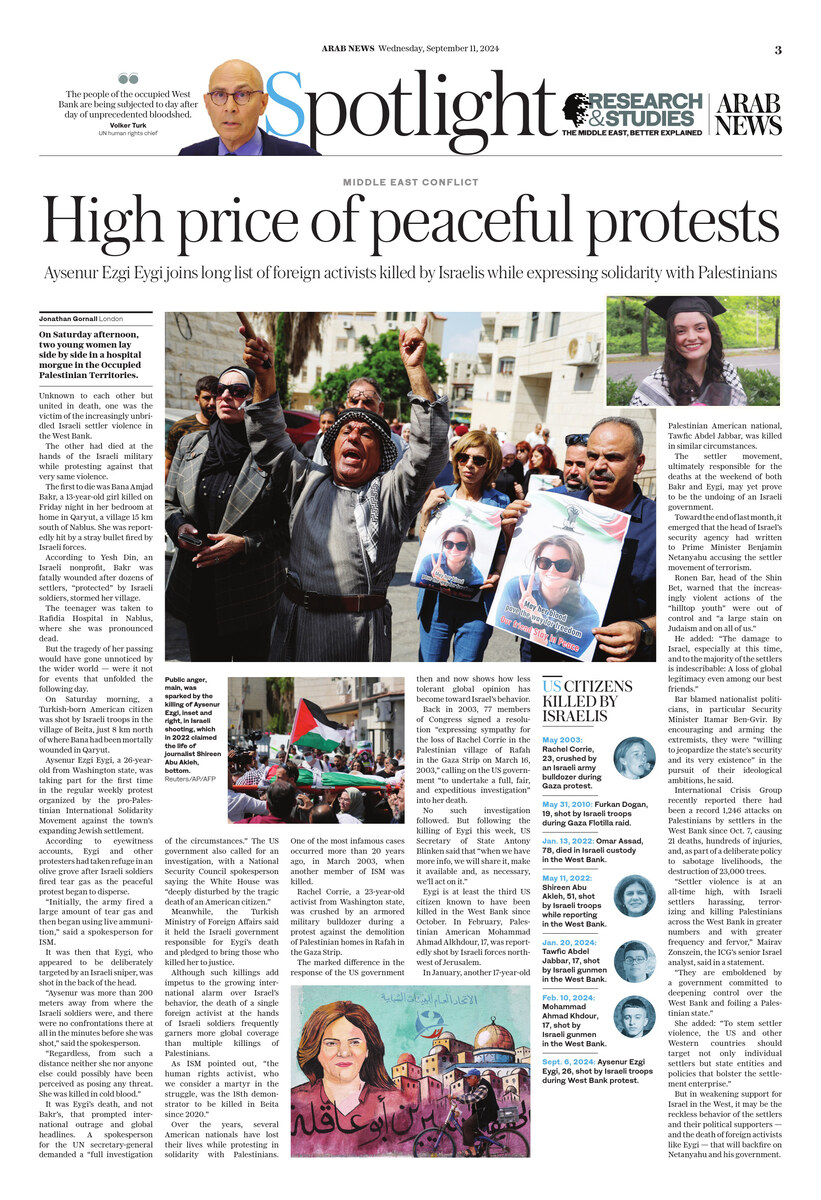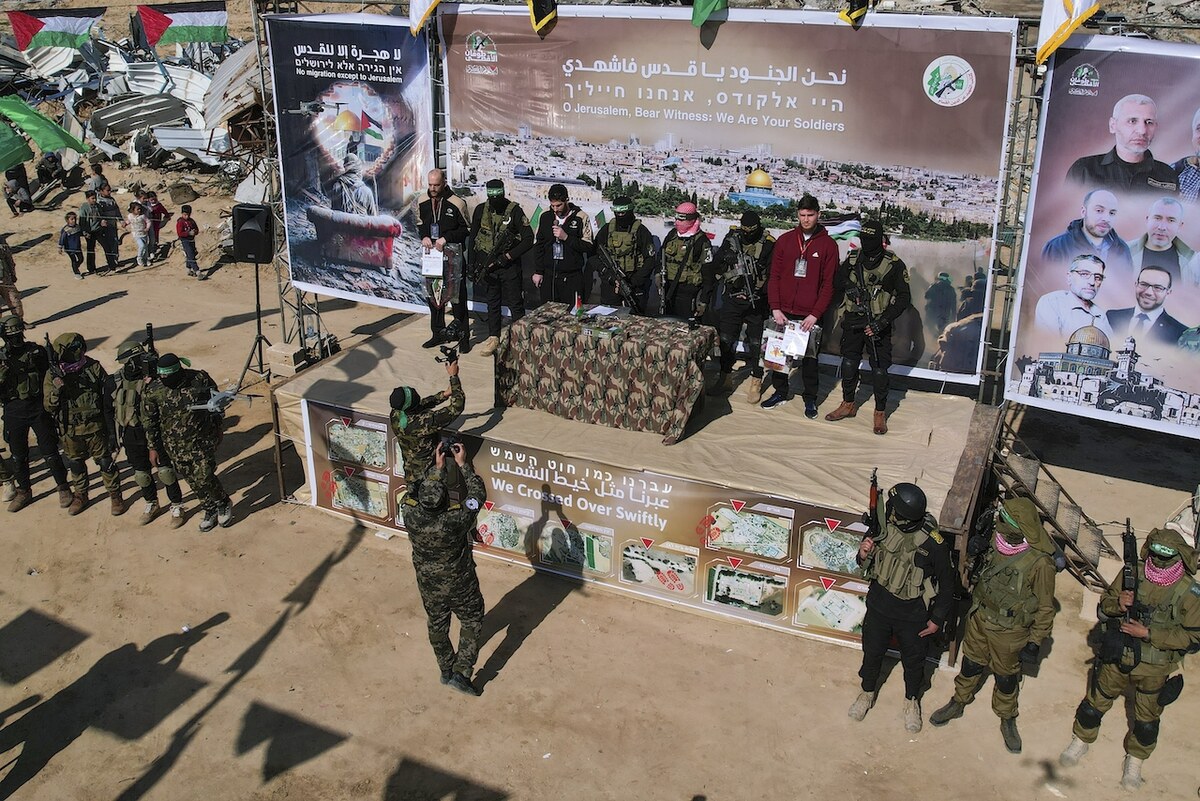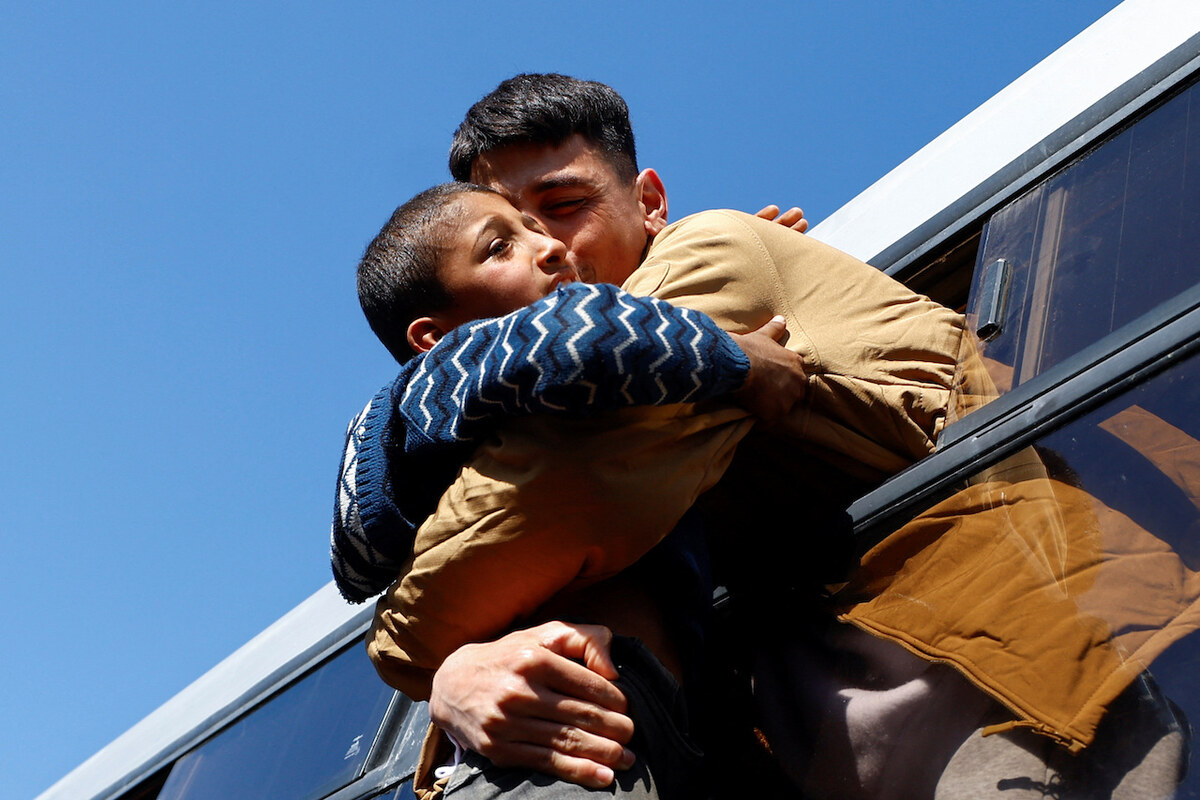LONDON: On Saturday afternoon, two young women lay side by side in a hospital morgue in the Occupied Palestinian Territories.
Unknown to each other but united in death, one was the victim of the increasingly unbridled Israeli settler violence in the West Bank.
The other had died at the hands of the Israeli military while protesting against that very same violence.
The first to die was Bana Amjad Bakr, a 13-year-old girl killed on Friday night in her bedroom at home in Qaryut, a village 15 km south of Nablus. She was reportedly hit by a stray bullet fired by Israeli forces.
According to Yesh Din, an Israeli non-profit organization that advocates for the human rights of Palestinians living under occupation, Bakr was fatally wounded after dozens of settlers, “protected” by Israeli soldiers, stormed her village.
The teenager was taken to Rafidia Hospital in Nablus, where she was pronounced dead.

Nablus Governor Ghassan Daghlas (3-R) stands in front of the bodies of Turkish-American Aysenur Ezgi Eygi, 26 (L) and 13-year-old Palestinian Bana Baker at a hospital morgue in Nablus in the occupied West Bank on September 7, 2024. (AFP)
But the tragedy of her passing and her family’s grief would have gone unnoticed by the wider world — were it not for events that unfolded the following day.
On Saturday morning, a Turkish-born American citizen was shot in the head by Israeli troops in the village of Beita, just 8 km north of where Bana had been mortally wounded in Qaryut.
Aysenur Ezgi Eygi, a 26-year-old from Washington state, had been taking part for the first time in the regular weekly protest organized by the pro-Palestinian International Solidarity Movement against the town’s expanding Jewish settlement.
Just three months ago, Eygi had graduated from the University of Washington in Seattle, where she had studied psychology and Middle Eastern languages and cultures.

Palestinian activists lift a banner and portraits of slain Turkish-American activist Aysenur Ezgi Eygi during a funeral procession in Nablus in the occupied West Bank on September 9, 2024. (AFP)
In a statement, her family said she had been active in pro-Palestinian protests on campus and had felt morally compelled to travel to the West Bank and “stand in solidarity with Palestinian civilians.”
According to eyewitness accounts, Eygi and other protesters had taken refuge in an olive grove after Israeli soldiers fired tear gas as the peaceful protest began to disperse.
“The demonstration, which primarily involved men and children praying, was met with force from the Israeli army stationed on a hill,” said a spokesperson for ISM.
“Initially, the army fired a large amount of tear gas and then began using live ammunition.”
It was then that Eygi, who appeared to be deliberately targeted by an Israeli sniper, was shot in the back of the head.

Israeli forces take position following a demonstration against the expropriation of Palestinian land by Israel in the village of Qaryut on September 15, 2023. (AFP)
ISM denied “repeated false claims” that demonstrators had been throwing rocks. “All eye-witness accounts refute this claim,” said the spokesperson.
“Aysenur was more than 200 meters away from where the Israeli soldiers were, and there were no confrontations there at all in the minutes before she was shot.
“Regardless, from such a distance neither she nor anyone else could possibly have been perceived as posing any threat. She was killed in cold blood.”
Opinion
This section contains relevant reference points, placed in (Opinion field)
It was Eygi’s death, and not Bakr’s, that prompted international outrage and global headlines. A spokesperson for the UN secretary-general demanded a “full investigation of the circumstances” and accountability for the death of the dual American-Turkish citizen.
The US government also called for an investigation, with a National Security Council spokesperson saying the White House was “deeply disturbed by the tragic death of an American citizen.”

Members of the Palestinian security forces carry the body of 13-year-old Bana Amjad Bakr during her funeral in Nablus. (AFP)
Meanwhile, the Turkish Ministry of Foreign Affairs said it held the Israeli government responsible for Eygi’s death and pledged to bring those who killed her to justice.
Although such killings add impetus to the growing international alarm over Israel’s behavior, in Gaza and the West Bank, the death of a single foreign activist at the hands of Israeli soldiers frequently garners more global coverage than multiple killings of Palestinians.
As ISM pointed out, “the human rights activist, who we consider a martyr in the struggle, was the 18th demonstrator to be killed in Beita since 2020” — the youngest of whom was just 13 years old.
Ghassan Daghlas, the governor of Nablus, paid his respects to Eygi and Bakr in an emotional visit to the morgue in Rafidia hospital on Saturday. “Both were killed by the same bullets,” he said.
“We call on the international community to stop the insane war on Palestine. Bullets do not differentiate between activists and a Palestinian child.”

People check a burnt car a day after an attack by Jewish settlers on the village of Jit near Nablus that left a 23-year-old man dead and others with critical gunshot wounds, on August 16, 2024. (AFP)
Over the years, several American nationals have lost their lives while protesting in solidarity with Palestinians. One of the most infamous cases occurred more than 20 years ago, in March 2003, when another member of ISM was killed.
Rachel Corrie, a 23-year-old activist from Washington state, was crushed by an armored military bulldozer during a protest against the demolition of Palestinian homes in Rafah in the Gaza Strip.
The Palestinians do not forget their friends. Many children born after Corrie’s death carry her first name and a street in Ramallah is named for her. But until now it has been difficult to conclude that sacrifices such as hers have not been in vain.
The marked difference in the response of the US government then and now shows how less tolerant global opinion has become toward Israel’s behavior.
US CITIZENS KILLED BY ISRAELIS
- May 2003: Rachel Corrie, 23, crushed by an Israeli army bulldozer during Gaza protest.
- May 31, 2010: Furkan Dogan, 19, shot by Israeli troops during Gaza Flotilla raid.
- Jan. 13, 2022: Omar Assad, 78, died in Israeli custody in the West Bank.
- May 11, 2022: Shireen Abu Akleh, 51, shot by Israeli troops while reporting in the West Bank.
- Jan. 20, 2024: Tawfic Abdel Jabbar, 17, shot by Israeli gunmen in the West Bank.
- Feb. 10, 2024: Mohammad Ahmad Khdour, 17, shot by Israeli gunmen in the West Bank.
- Sept. 6, 2024: Aysenur Ezgi Eygi, 26, shot by Israeli troops during West Bank protest.
Back in 2003, 77 members of the US Congress signed a resolution “expressing sympathy for the loss of Rachel Corrie in the Palestinian village of Rafah in the Gaza Strip on March 16, 2003,” calling on the US government “to undertake a full, fair, and expeditious investigation” into her death.
No such investigation followed. But following the killing of Eygi this week, US Secretary of State Antony Blinken said that “when we have more info, we will share it, make it available and, as necessary, we’ll act on it.”
Eygi is at least the third US citizen known to have been killed in the West Bank since October. In February, Palestinian-American Mohammad Ahmad Alkhdour, 17, was reportedly shot twice by Israeli forces northwest of Jerusalem.
In January, another 17-year-old Palestinian-American national, Tawfic Abdel Jabbar, was killed in similar circumstances.

A Palestinian girl holds posters of US peace activist Rachel Corrie during a protest marking the anniversary of her death at a refugee camp in Rafah on March 16, 2013. (AFP)
The settler movement, ultimately responsible for the deaths at the weekend of both Bakr and Eygi, may yet prove to be the undoing of an Israeli government that has not only given it free rein to expand settlements, but has also armed it to the teeth.
Toward the end of last month, it emerged that the head of Israel’s security agency had written to Prime Minister Benjamin Netanyahu accusing the extremist settler movement of terrorism.
Ronen Bar, head of the Shin Bet, warned that the increasingly violent actions of the “hilltop youth” were out of control and “a large stain on Judaism and on all of us.”
He added: “The damage to Israel, especially at this time, and to the majority of the settlers is indescribable: A loss of global legitimacy even among our best friends.”
Bar blamed nationalist politicians, in particular Security Minister Itamar Ben-Gvir. By encouraging and arming the extremists, they were “willing to jeopardize the state’s security and its very existence” in the pursuit of their ideological ambitions, he said.

Palestinian medics transport a man who was injured in a reported attack by Israeli settlers in the village of Qusra, into Rafidia Hospital in Nablus on August 31, 2024. (AFP)
International Crisis Group recently reported there had been a record 1,246 attacks on Palestinians by settlers in the West Bank since Oct. 7, causing 21 deaths, hundreds of injuries, and, as part of a deliberate policy to sabotage livelihoods, the systematic destruction of 23,000 trees.
“Settler violence is at an all-time high, with Israeli settlers harassing, terrorizing and killing Palestinians across the West Bank in greater numbers and with greater frequency and fervor,” Mairav Zonszein, the ICG’s senior Israel analyst, said in a statement on Friday.
“They are emboldened by a government committed to deepening control over the West Bank and foiling a Palestinian state.”
She added: “To stem settler violence, the US and other Western countries should target not only individual settlers but state entities and policies that bolster the settlement enterprise.”
But in weakening support for Israel in the West, ultimately it may be the reckless behavior of the settlers and their political supporters — and the death of foreign activists like Eygi — that will backfire on Netanyahu and his government.































